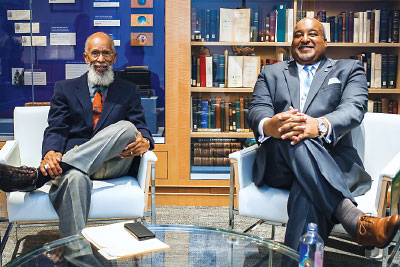APA Library & Archives Hosts Exhibit on Historic Central State Hospital
Abstract
White superintendents of asylums in the 19th century—to the extent they considered African Americans at all—believed that slavery offered a kind of protection against insanity.

King Davis, Ph.D. (left), and Rawle Andrews Jr., Esq., pause for a photo during the Central State Hospital exhibit in the Melvin Sabshin, M.D. Library and Archives.
That was the opening message of a film shown in a special program at APA headquarters in September that featured an exhibit on the history and meaning of Central State Hospital in Virginia, the first state asylum in the United States created for African Americans. The program was sponsored by the APA Foundation and Friends of Virginia’s Central State Hospital. Deena Gorland, M.S.L.I.S., APA’s librarian and archivist, organized the program and curated the exhibit.
The hospital opened in 1870 as Central Lunatic Asylum for Colored Insane and remained segregated until the passage of the Civil Rights Act of 1964. Over that time, thousands of documents, admissions records, board minutes, photographs, and more accumulated, some of which were put on display in the program’s exhibit in APA’s Melvin Sabshin, M.D. Library and Archives. These documents were cataloged and digitized beginning in 2009 by esteemed historian King Davis, Ph.D., and a team of 17 scholars at the University of Texas at Austin.

Above are a few of the artifacts on display in the exhibit. Visit the virtual exhibit.
In addition to learning about the origins of the hospital and viewing the items on exhibit, attendees discussed how historical predictions of excess rates of illness based on race and freedom negatively influenced admissions, diagnoses, treatment, and public perceptions.
“Part of the role of the APA Foundation’s Melvin Sabshin, M.D. Library and Archives is to preserve and to examine psychiatry’s history, so we can reflect on and learn from our past,” said Executive Director Rawle Andrews Jr., Esq.
“The history of race and mental health that is reflected in the 100 years of written documents from Central State Hospital is invaluable,” said Davis, who is also chair of the Friends of Virginia’s Central State Hospital. “These archives allow us to utilize information about the hospital’s evolution to inform the future of mental health practice and education. It is important to propose, provide, and support events and activities that contribute to increased access by Black families to genealogical and treatment information that enhances their mental health literacy, help seeking, and use of services.” ■



